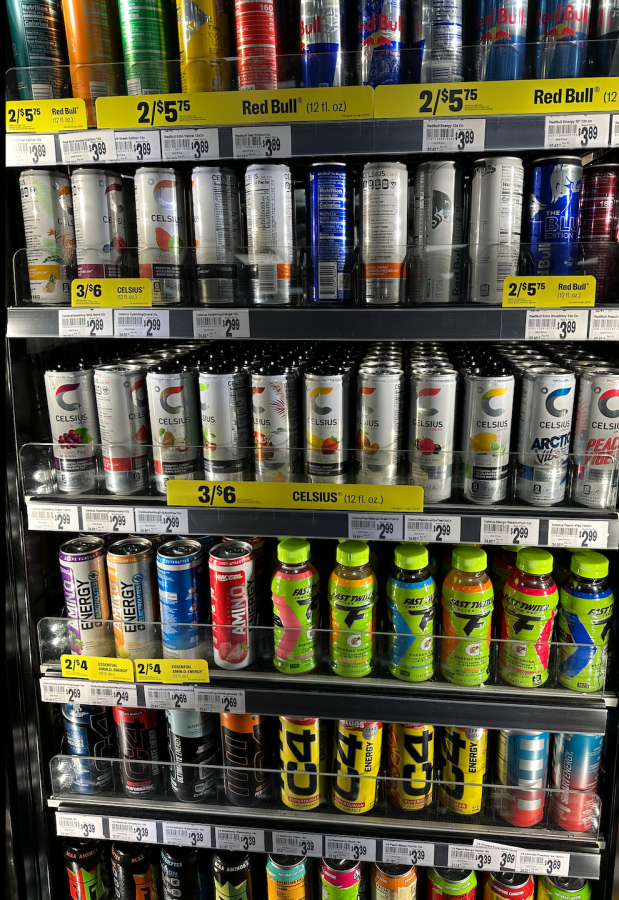To Some Degree, Celsius Isn’t So Bad
Celsius—a popular energy drink offered in a variety of flavors—may be delicious, but is it safe to consume regularly?
Depending whom you ask about Celsius, a popular energy drink among fitness-fanatics nationwide, you’ll receive varied responses. Some say it’s purely toxic chemicals, while others rave about its caffeinating properties. In reality, Celsius—a delicious, carbonated concoction—is packed with potentially dangerous ingredients, masked by a low-calorie, sugar-free label.
Recently banned by the National Collegiate Athletic Association (NCAA), Celsius has been boycotted across the country, as many experts identify just how harmful the drink is, particularly for growing teens.
Among these experts is Upper School biology teacher Sarah Kutschke. “[Celsius] scares me, because of the caffeine, the artificial sweeteners, and the guarana and taurine in these drinks,” Ms. Kutschke said, “It scares me that kids are drinking multiple a day, that they drink them before working out.”
Guarana extract, one of the many drugs prohibited by the NCAA, is present in Celsius and has stimulating and caffeinating properties, making the potent extract a twofold problem for competitive athletics.
On top of 200 milligrams of caffeine, Ms. Kutschke noted, Celsius has another dangerous ingredient: artificial sweeteners. “Artificial sugars, as we know, are worse for you,” she said. Sucralose is listed under “other ingredients” on a Celsius can, perhaps so that consumers don’t think much of it. As its name suggests, sucralose is somewhat of a descendant of sucrose, baiting itself as a natural, calorie-free sweetener. Sucralose substitutes the naturally-occurring chlorine in sucrose for hydroxyl, resulting in a much sweeter taste. Many people feel more satisfied consuming sugar alcohols rather than granulated sugar, and consequently, many people become addicted to products with sugar alcohols.
Researching this favorite energy drink of mine, I’ve become much more conscious of my Celsius intake. After a biology unit on artificial sweeteners and how they’re chemically manipulated into tasting even sweeter than real sugar, I’ve limited my intake of products with sugar alcohols. Now, I limit myself to two cans of Celsius over the weekend prior to going out with friends, or on early mornings. While I recognize the health risks associated with Celsius, since I started drinking the beverage in the summer of 2021, I haven’t noticed any imminent health-related problems. By drinking Celsius before a swim meet or a run, I feel more energized and have prolonged stamina.
“I don’t use it directly to help me in sports or anything, I just use it as a coffee,” sophomore Isabella Carney said. While Celsius is designed to aid athletes with their energy levels, the drink also claims to “burn body fat” and “boost metabolism,” both of which occur naturally as a result of working out.
Burning fat can only occur once your body has used the calories from quickly disposable carbohydrates, like bread, and needs more energy from fats stored throughout the body. Building muscle boosts metabolism, as building muscle requires more calories to sustain itself than fat does. So the drink doesn’t exactly make you shredded or eliminate calories previously consumed, but it can boost your endurance during a workout to achieve both of those things.
Despite the recent boycott, I’ve begun to admire Celsius’ easy accessibility. At almost any gas station, I can find a can; its popularity is strikingly close to Red Bull’s. Compared with Red Bull’s label price of $2.68, Celsius is, on average, 50 cents cheaper. On the other hand, Red Bull doesn’t have guanine or sucralose. Both Celsius and Red Bull contain potentially dangerous ingredients, but Red Bull is certainly the lesser of the two evils, with a far shorter list of harmful chemicals.
When considering the NCAA athletes I admire—Jake Mitchell, Emma Ward, Charlotte North—and their success without questionable energy drinks, I realize that depending on a caffeine-dense supplement for increased performance might not be more beneficial than a rudimentary athlete diet. In biology this year, I’ve been learning about what food groups to eat before sports practices—simple carbohydrates like bread and natural sugar can produce similar and much healthier results for your body than Celsius. These foods are also easier on your digestive system and brain.
Isabella says she drinks Celsius about four times per week. Regarding future health effects, she said, “I think in the future, in the long run, I’m kind of worried, but I feel [the same] with so many things these days,” adding that “That’s not just exclusive to Celsius. With all the things we’re consuming, there could be long-term health effects.”
“Right now, I feel like Celsius is more beneficial to my health than it is harmful,” Isabella said.
However, senior Ava Rosenow said her father, a neurosurgeon at Northwestern familiar with Celsius’ ingredients, “will die before he lets me touch a Celsius.”

Annie Hallinan (‘24) is a senior at Latin who is beyond excited to return to The Forum for her third year on staff. Aside from serving as Managing &...

























































Milton • Jul 18, 2024 at 2:39 pm
Great article-very informative! The term “sugar alcohol” as applied to sucralose could be misleading, though, even though it is completely accurate chemically. Most sugar alcohols used as sweeteners (xylitol, erythritol, sorbital, etc.) are natural plant substances that have been consumed for centuries. Sucralose popped out of a lab in the 1970s and has only been on the market since the 1990s (hence Dr. Rosenow’s reasonable skepticism about its safety).
Chase • Feb 17, 2023 at 2:58 pm
Incredible article! Great job Annie!!